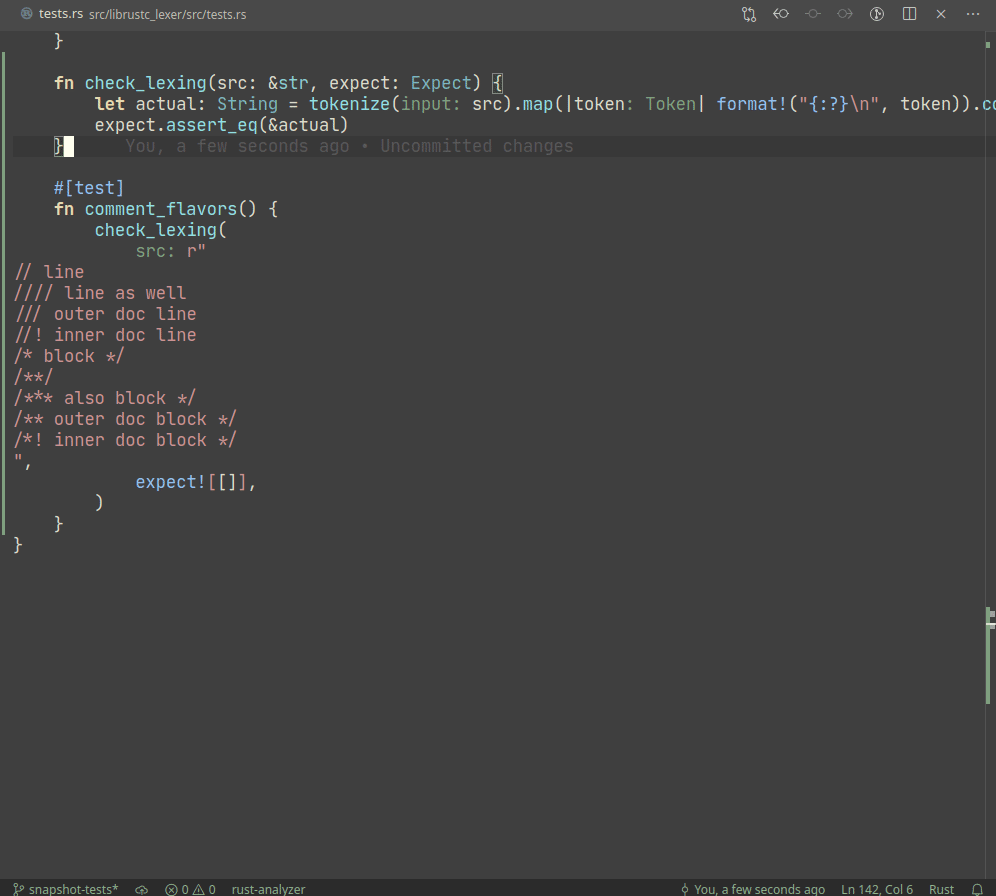2019-05-06 11:53:40 +03:00
|
|
|
[package]
|
|
|
|
|
name = "rustc_lexer"
|
|
|
|
|
version = "0.1.0"
|
2019-09-05 23:03:50 +03:00
|
|
|
license = "MIT OR Apache-2.0"
|
2021-09-19 12:49:55 -04:00
|
|
|
edition = "2021"
|
2019-05-06 11:53:40 +03:00
|
|
|
|
2019-09-05 23:03:50 +03:00
|
|
|
repository = "https://github.com/rust-lang/rust/"
|
|
|
|
|
description = """
|
|
|
|
|
Rust lexer used by rustc. No stability guarantees are provided.
|
|
|
|
|
"""
|
|
|
|
|
|
2019-07-27 22:10:09 +09:00
|
|
|
# Note: do not remove this blank `[lib]` section.
|
|
|
|
|
# This will be used when publishing this crate as `rustc-ap-rustc_lexer`.
|
2019-07-27 17:21:42 +09:00
|
|
|
[lib]
|
2019-07-21 14:50:39 +03:00
|
|
|
|
|
|
|
|
# Note that this crate purposefully does not depend on other rustc crates
|
|
|
|
|
[dependencies]
|
|
|
|
|
unicode-xid = "0.2.0"
|
2021-08-29 08:34:23 +00:00
|
|
|
unic-emoji-char = "0.9.0"
|

Introduce expect snapshot testing library into rustc
Snapshot testing is a technique for writing maintainable unit tests.
Unlike usual `assert_eq!` tests, snapshot tests allow
to *automatically* upgrade expected values on test failure.
In a sense, snapshot tests are inline-version of our beloved
UI-tests.
Example:

A particular library we use, `expect_test` provides an `expect!`
macro, which creates a sort of self-updating string literal (by using
`file!` macro). Self-update is triggered by setting `UPDATE_EXPECT`
environmental variable (this info is printed during the test failure).
This library was extracted from rust-analyzer, where we use it for
most of our tests.
There are some other, more popular snapshot testing libraries:
* https://github.com/mitsuhiko/insta
* https://github.com/aaronabramov/k9
The main differences of `expect` are:
* first-class snapshot objects (so, tests can be written as functions,
rather than as macros)
* focus on inline-snapshots (but file snapshots are also supported)
* restricted feature set (only `assert_eq` and `assert_debug_eq`)
* no extra runtime (ie, no `cargo insta`)
See https://github.com/rust-analyzer/rust-analyzer/pull/5101 for a
an extended comparison.
It is unclear if this testing style will stick with rustc in the long
run. At the moment, rustc is mainly tested via integrated UI tests.
But in the library-ified world, unit-tests will become somewhat more
important (that's why use use `rustc_lexer` library-ified library as
an example in this PR). Given that the cost of removal shouldn't be
too high, it probably makes sense to just see if this flies!
2020-08-21 14:03:50 +02:00
|
|
|
|
|
|
|
|
[dev-dependencies]
|
2022-11-22 17:41:06 +03:00
|
|
|
expect-test = "1.4.0"
|